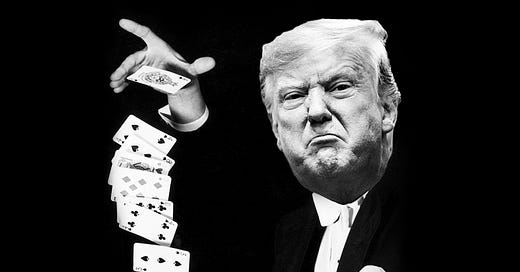
Could Trump Be the River Card That Helps Democrats Hold the House?
Democrats face long odds. But not impossible odds.
Could Democrats hold the House of Representatives in 2022? History suggests not. The number of Democratic congressional retirements suggests not. President Biden’s approval rating suggests not. The current generic ballot suggests really not.
The odds aren’t great.
But the odds aren’t as overwhelming as is sometimes assumed, either. There is hope. Hope isn’t a substitute for hard work. But hard work is harder without hope. Are there any grounds for reasonable hope for pro-Democratic forces in 2022?
Yes.
The president’s party gained seats in two of eight of post-Cold War off-year elections. One out of four times isn’t great. But one out of four also isn’t nothing. One out of four comes up all the time.
What characterized the political landscape in those two elections, 1998 and 2002? In both cases, the incumbent president was popular. And in 1998 the opposition party had alienated voters by pushing for the impeachment of this popular president.
On election day this year, President Biden is highly unlikely to have anything like the approval numbers President Bill Clinton had in 1998 or President George W. Bush had in 2002. Biden is now at a pretty grim 43 percent approval vs. 52 percent disapproval. He’s been at this level for about two months, which means that he’s stopped falling. This could be a pause. Or a steady-state. Or a prelude to recovery.
So could Biden recover enough to give his party a fighting chance?
Perhaps.
Consider COVID.
Delta and then Omicron damaged the sense that the administration had succeeded in getting COVID under control. But COVID really is likely (finally!) to recede this spring. A non-pandemic summer, and a return to normalcy as schools reopen in September, could well be worth a point or two for Biden.
Consider the economy.
It’s pretty good! And if inflation recedes some, which there’s a decent chance will happen, we’ll have a strong economy which will not look like a barren socialist landscape. Low unemployment, rising wages, continued good performance by the stock market—with inflation under control—is by no means outside the realm of possibility. It’s not even unlikely. Perhaps Biden could gain another point or two for that.
One more fact to keep in mind when you see those big numbers of the average seats lost by the president’s party in midterms: In most cases, the president’s party started from a much higher base than the Democrats have now, with 222 seats (allocating to them the one of the two vacancies that was a Democratic seat). Remember: Democrats already lost 13 seats in 2020—perhaps some of the normal midterm regression was baked into Biden’s initial election.
What about the current generic congressional ballot? The FiveThirtyEight average has Republicans with a 42.4 to 41.9 percent advantage. This number usually moves a bit more in the direction of the party out of power during the election year—so it’s not great for Democrats. On the other hand, a half a percent deficit isn’t overwhelming and the gap has actually closed a bit since early December. Also, redistricting seems to have helped Republicans less than expected.
If Democrats could pick up about three points on the congressional ballot over the next nine months, they could hold the House. Such a gain may be unlikely, perhaps even highly unlikely. But it isn’t beyond imagination.
Which brings us to the Democrats’ hole card: The Republicans—and in particular the numero uno Republican, the 45th president of the United States, Donald J. Trump.
How much could Trump-caused, Trump-aligned, or Trump-adjacent madness damage Republican candidates in 2022? We don’t know, partly because we’ve never really had a situation like the current one. What we do know is that the great bulk of the Republican party’s candidates will be aligned with and perhaps seen to be marching behind a former president who’s not popular with swing voters, whose visibility could motivate lots of Democrats to vote, and whose behavior could make it far easier for Democrats to link Republicans to unpopular causes. The report by the January 6th Committee could play a role here too.
In any case, Trump is an unusual wild card. Or, to slightly mix metaphors, one can say he’s not the card Republicans would want the Texas Hold’em dealer to turn over as the river in October. And of course, Trump will want to appear on the green felt of the political poker table at a time when he can get the most attention.
I’m not a big Texas Hold’em player, but I know enough to know that you don’t want to have to count on the river card to grab a low-probability win. Which is what Democrats will have to do, because the flop has been little help to them.
But sometimes all you can do is play your hand well enough to still have a chance on the final card.





